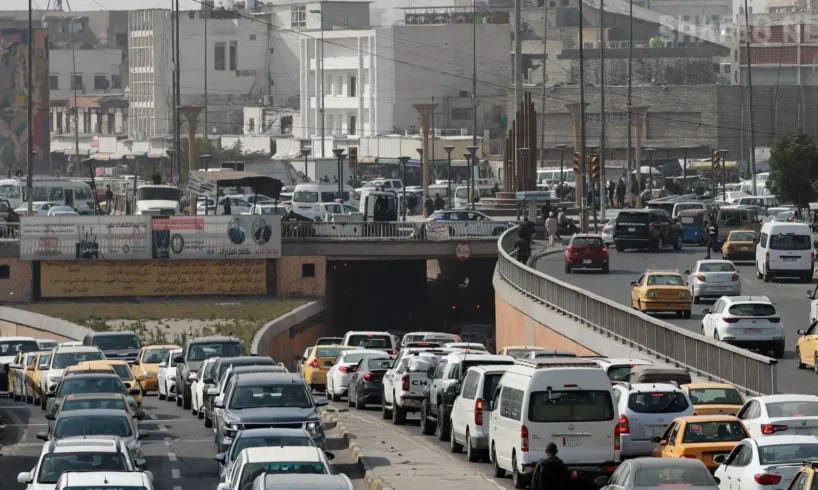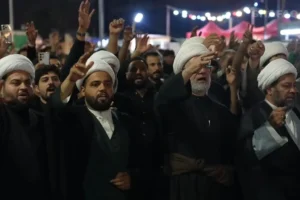
Shafaq News
Despite years of investment in bridges and
infrastructure, Baghdad’s streets remain choked, with commuters often spending
hours crawling through traffic during peak periods. The Iraqi capital’s road
network is struggling under an unprecedented surge in vehicles, prompting
questions about when relief might arrive.
Bribes or Bridges
Observers point to poor planning, the absence
of integrated solutions, and reliance on local fixes—such as constructing
bridges that merely shift congestion from one area to another—without
addressing underlying causes.
Member of the Parliamentary Transport
Committee Aqeel Al-Fatlawi conveyed to Shafaq News that “hopes were pinned
on infrastructure projects to solve traffic congestion, but reality has proven
otherwise.”
He noted that building bridges failed to
produce the anticipated benefits, cautioning that, despite massive
expenditures, many bridges were ineffective, and some were completed for
electoral purposes, as they could be finished within the current government’s
term.
“There are suspicions of corruption in
granting exemptions to executing companies and bypassing official tender
procedures,” the lawmaker emphasized.
Read more: Traffic congestion drains Iraq’s economy, hampers growth
Stressing that the Transport Committee does
not oppose bridge construction, “provided it is within a sound and
well-studied plan,” Al-Fatlawi criticized the sidelining of alternative
strategic projects such as the suspended monorail, which could have more
effectively and sustainably eased pressure on the city’s roads.
Stop the Imports
Transport expert Basel Al-Khafaji noted to
Shafaq News that traffic jams in Baghdad will not be resolved as long as cars
continue to be imported without controls, with attractive installment sale
schemes, and without policies to phase out old vehicles.
Government data highlighted that vehicles now
exceed the city’s street capacity by more than seven times, overburdening a
system already strained by rapid population growth. Baghdad’s population has
surged from 6 million in 2010 to over 9 million today, while 200,000–300,000
new cars are added each year. In 2023 alone, Iraq imported about 636,000
vehicles, a figure expected to reach 1.1 million by 2025.
Al-Khafaji pointed out that congestion is now
responsible for dozens of traffic accidents daily, “amid a lack of serious
government interventions.’’ Ministry of Interior statistics indicate that
traffic accidents in Iraq reached 11,552 in 2023, causing 3,019 deaths, while
Baghdad alone recorded 12,019 incidents, averaging 1,092 annually. Of these,
22% were fatal and 67% resulted in injuries.
“Any new project under the current
approach is just a temporary fix, not a solution to the core problem,” he
warned.
Read more: Rusting ambition: Iraq’s railway stalled by neglect
Baghdad Bursting Beyond Its Roads
Meanwhile, spokesman for the Ministry of
Construction, Housing, and Municipalities, Nabil Al-Saffar, defended his
ministry’s efforts, emphasizing that population growth and the surge in car
numbers in recent years have outpaced the capacity of the old infrastructure,
which was not designed for this scale.
“Baghdad has been constrained by decades
of conflict, rapid informal settlement growth, and the concentration of
governmental and commercial services in central districts,” he remarked to
our agency.
Highlighting that the ministry has implemented
a package of projects over the past three years to ease bottlenecks in Baghdad,
Al-Saffar noted that the first package included 16 projects out of 60, with
most completed in priority areas experiencing the heaviest congestion.
He also detailed that past projects
encompassed 13 river-crossing bridges, six new bridges under the first and
second packages, 32 overpasses, seven tunnels, three new roads, and 12 fully
completed projects, each consisting of multiple components such as overpasses,
tunnels, and roads.
The total budget for these projects exceeded
$1.2 billion, reflecting the government’s significant investment in
infrastructure despite challenging fiscal conditions.
Stating that these projects “made a
difference in some areas, reducing travel time and noticeably easing
congestion,” Al-Saffar acknowledged that further complementary projects
remain necessary, depending on financial allocations.
Read more: Baghdad metro, Najaf-Karbala train: grand plans, ground reality of delays
$380M burnt
Daily congestion in Baghdad now costs
residents an estimated 2–3 hours each day in traffic, leading to fuel wastage,
lost productivity, and increased air pollution. Traffic delays generate annual
economic losses of about 500 billion Iraqi dinars (around $380 million).
Environmental studies further indicated that
vehicle emissions in Baghdad have risen sharply in recent years, aggravating
respiratory illnesses and lowering overall air quality. According to the 2024
Global Traffic Scorecard, workers in heavily congested cities lose between 100
and 150 hours annually, translating into economic losses equivalent to 2–5% of
GDP in comparable urban settings.
To confront these challenges, Iraq has
launched additional large-scale projects aimed at tackling long-term traffic
and transportation issues. The Baghdad Elevated Train (BET), the country’s
first elevated automated metro system, is expected to cover more than 85% of
the capital and its suburbs, carrying nearly 5 million passengers daily.
Meanwhile, the Iraq Railways Extension and
Modernization (IREM) Project, with a budget of $930 million, seeks to upgrade
rail services between Umm Qasr Port in the south and Mosul in the north,
cutting travel times and expanding freight capacity.
Read more: Iraq’s stalled projects: Chronic bottlenecks and new revival efforts
Traffic management efforts in Baghdad also
include installing surveillance cameras and radars at key intersections,
alongside improved traffic signal operations to better regulate vehicle flow.
Looking further ahead, Iraq’s Grand al-Faw
Port—part of a $17 billion infrastructure initiative—aims to establish a
strategic trade corridor linking the Middle East and Europe through Turkiye.
The country also introduced the TIR (Transports Internationaux Routiers) system
in April 2025, marking a significant step in modernizing international
logistics and trade facilitation.
Written and edited by Shafaq News staff.





